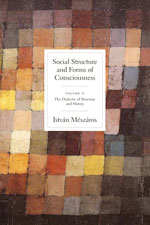Making Oppression Appear Normal
Psychologists engage in a number of practices that, mostly unwittingly, help to sustain the cultural distortions of the ruling class and hence their exploitative rule. One of these practices is to treat human behavior as primarily driven by biology. This leads, for example, to the medicalization of mental illness.… It also supports one of capitalists’ favorite ideological ploys: individualism. We are the masters of our own fate, not society and its culture. If we fail, it is our own fault. We simply did not try hard enough or follow the right path. Individualism favors self-blame and a refusal even to look for social causes. Ratner instead argues that humans are qualitatively different from all other species precisely in terms of how culture, not constant biological traits, shape their behavior. He points out that even our closest relatives, the great apes, have not developed culture, institutions, science, religion, etc. We are truly unique.… | more |
Privatization of Consciousness
Is advertising legal? Most people agree that it is an uninvited intrusion into our lives and our minds, an invasion of privacy. But the fact that we can be aware of this without being furious, and that we do little to change the situation, is a good measure of our level of submission. There is a power relationship in advertising that is rarely, if ever, looked at, and yet it is a profoundly corrupt one. Some speak; others listen.… A. J. Liebling famously said, “Freedom of the press is guaranteed, but only if you own one.” Freedom of speech is also guaranteed. But only if you have a few million dollars for an effective media strategy. Soapbox oratory doesn’t sway the public anymore. But the powers of advertising go well beyond the amount of money spent. The true power is in the nature of moving-image media, projected for hours every day into human brains. It’s a form of intrusion we have never before in history had to face. Even now in the Internet age, the powers of television and advertising are undiminished and insufficiently examined or discussed.… | more |
For the past three decades Howard Waitzkin has been (along with Vicente Navarro) the leading social medicine theorist in the United States. Medicine and Public Health at the End of Empire provides a superb sampling of Waitzkin’s wide-ranging work, and a readily accessible introduction to the searching insights offered by a Marxist view of medicine.… | more |
Fredric Jameson on the Reserve Army
In the opening pages of The Limits to Capital, published in 1984, David Harvey jokes that everyone who reads Marx’s Capital seems bound to write a book about it. In 2012, we might well ask: Just one? Last year, many of the long-standing academic Marxists unleashed new introductory works, including Terry Eagleton, David Harvey, Eric Hobsbawm, and, unsurprisingly, Fredric Jameson. In Representing Capital, Jameson has written the best of the bunch: a surprising, energetic, and concise representation of the “totality” of capital.… | more |
The Democratic Fraud and the Universalist Alternative
The propositions put forward here—and many other possible ones—have no place in the dominant discourse about “civil society.” Rather, they run counter to that discourse which—rather like “postmodernist” ravings à la Negri—is the direct heir of the U.S. “consensus” ideological tradition. A discourse promoted, uncritically repeated, by tens of thousands of NGOs and by their requisite representatives at all the Social Forums. We’re dealing with an ideology that accepts the existing regime (i.e. monopoly capitalism) in all its essentials. It thus has a useful role to play on behalf of capitalist power. It keeps its gears provided with oil. It pretends to “change the world” while promoting a sort of “opposition” with no power to change anything.… | more |
The Dialectic of Structure and History: An Introduction
The investigation of the dialectical relationship between structure and history is essential for a proper understanding of the nature and the defining characteristics of any social formation in which sustainable solutions are being sought to the encountered problems. This is particularly important in the case of capital’s social formation, with its inexorable tendency toward an all-embracing, structurally embedded determination of all aspects of societal reproduction and the—feasible for the first time ever—global domination implicit in that form of development. It is therefore by no means accidental that, in the interest of the required structural change, Marx had to focus critical attention on the concept of social structure, in the historical period of crises and revolutionary explosions of the 1840s when he articulated his own—radically new—conception of history.… | more |

NEW: Social Structure and Forms of Consciousness, Volume II by István Mészáros
Monthly Review Press is proud to announce the release of Volume II of Social Structure and Forms of Consciousness, the magisterial work by István Mészáros, one of the world’s most esteemed Marxist philosophers. Order both volumes for $40.… | more |

Social Structure and Forms of Consciousness, Volume II
The Dialectic of Structure and History
In The Dialectic of Structure and History, Volume Two of Social Structure and Forms of Consciousness, István Mészáros brings the comprehension of our condition and the possibility of emancipatory social action beyond the highest point reached to date. Building on the indicatory flashes of conceptual lightning in the Grundrisse and other works of Karl Marx, Mészáros sets out the relations of structure and agency, individual and society, base and superstructure, nature and history, in a dialectical totality open to the future.… | more |

An Anthology
José Carlos Mariátegui is one of Latin America’s most profound but overlooked thinkers. A self-taught journalist, social scientist, and activist from Peru, he was the first to emphasize that those fighting for the revolutionary transformation of society must adapt classical Marxist theory to the particular conditions of Latin American. He also stressed that indigenous peoples must take an active, if not leading, role in any revolutionary struggle.… | more |
Sol Yurick writes radical novels, good ones, and loves to speculate on how culture gets inside people’s bones. In the early 1970s, Sol and I spend a lot of time musing over Monopoly, a game many leftists love to hate, others hate to love, and practically everybody plays. According to Shelly Berman, the comedian, “Monopoly evokes a unique emotion, the surge of thrill you get when you know you’ve wiped out a friend.” But what else is going on as we accumulate property and scheme how to beggar our neighbors? Are we simply expressing some atavistic urge for power, or tuning in, consciously or unconsciously, to the attitudes that are most highly prized in our business-oriented society?… | more |






































